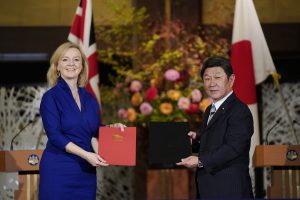Meeting in Tokyo in late October, Japan’s foreign minister Motegi Toshimitsu and Britain’s international trade secretary Liz Truss signed a bilateral trade deal called the “Comprehensive Economic Partnership Agreement (CEPA).” The fact that Truss travelled all the way to Tokyo just to sign the agreement was a clear indicator of the importance London attached to the deal.
The Japan-U.K. deal is, in essence, a roll-over agreement based on the Japan-EU Economic Partnership Agreement that entered into force in February 2019. In a limited number of (albeit important) areas, such as digital trade, data transfer and financial services, the deal goes beyond the Japan-EU agreement, enabling both sides to trumpet it as a cutting-edge, new-generation EPA.
The U.K. agreed to abolish tariffs on auto and rail parts on day one, rather than after several years as in the EU-Japan EPA – good news for Japanese manufacturers operating in the U.K. At the same time, it is curious that the British side claims that abolishing import tariffs on car and rail parts – normally seen as a costly concession – is about supporting the U.K.’s car and rail manufacturing, which is heavily dependent on Japanese companies possessing production facilities in the U.K., thereby creating jobs locally. This is what free trade and foreign direct investment are all about, a sensible position in the midst of a political climate that is increasingly not at all sensible.
From Tokyo’s perspective, the deal is frankly unspectacular. Tokyo has never been enthusiastic about the deal with the U.K., which would not have been necessary without Brexit, something Japan did not want. Tokyo had to do this deal just to keep the terms of trade with the U.K. following the end of the Brexit transition period at the end of December 2020. Tokyo could have pursued a more ambitious deal, but faced a trade-off between seeking to be ambitious in terms of substance and ensuring that any agreement could be concluded on time. Ultimately, Tokyo prioritized the latter, knowing that there will be another occasion to negotiate any leftovers with the U.K., once London applies to join the Trans-Pacific Partnership (TPP, or CPTPP). Therefore, the negotiations and the eventual deal have always been a low-key affair in Japan.
London, in contrast, from the beginning wanted to use the deal with Japan as a demonstration that the Johnson government is fully capable of making trade deals with other countries, a symbol of “global Britain” and a message to two audiences. The first message is to the British people, particularly those who are increasingly skeptical about the direction of the Johnson government, a group that includes the business community, which is becoming more worried about the prospect of a no-deal end to the transition period. Truss’ dubious claim that “This British-shaped deal is tailored to the U.K. economy, goes beyond the existing EU agreement and includes major wins that would be impossible as part of the EU (emphasis added)” can only be understood in a domestic political context. The deal with Japan, in a sense, is being used in the U.K. for political consumption, with little resistance from Tokyo.
Second, the deal with Japan is also a message to Brussels, showing that London is a serious and reliable trade partner capable of concluding a deal with major countries such as Japan. The subtext is that the U.K. has managed to make a deal with Japan because Japan was reasonable, whereas the impasse in negotiations with Brussels reflect Brussels’ inflexibility and dogmatism. The mid-September timing of the announcement of the agreement in principle also frustrated Brussels, as it coincided with the controversy over the U.K.’s Internal Market Bill, which was accused of violating part of the Withdrawal Agreement between the EU and the U.K. Eurocrats in Brussels wondered what the U.K. had agreed with Japan. Yet, siding with the U.K. in this regard was hardly Tokyo’s intention.
Critics are pointing to the U.K. government estimate that the EPA will increase Britain’s long run GDP by a mere 0.07 percent. To be sure, the economic impact is modest and the agreement is largely an exercise in damage limitation. Yet, the Japan-U.K. EPA should not be understood in trade and economic terms alone; the agreement is also designed to serve as a basis for a new strategic partnership between the two countries.
For London, this partnership is an important pillar in its concept of “global Britain,” and particularly in the context of its new “tilt to the Indo-Pacific,” likely to be featured in the upcoming Integrated Review. Joining the TPP is high on the government’s agenda and it is set to start a formal process of accession in 2021. Deploying the aircraft carrier HMS Queen Elizabeth to the Asia-Pacific soon is also part of this picture, indicating London’s desire to raise not just its economic, but also its political and security profile in the world and to rebalance its foreign relations.
Tokyo has consistently welcomed the London’s willingness to step up its political and security engagement in Asia, or the wider Indo-Pacific. The U.K. is an important strategic partner, sharing values and interests, and like Japan is a staunch ally of the U.S. The U.K.’s special ties with Australia and other Commonwealth countries in the Indo-Pacific region can also be seen as an asset in terms of developing Japan-U.K. political and security cooperation as Tokyo strengthens cooperation with Australia and increases its presence in the region.
That said, officials and experts in Tokyo (just like those in the U.K.) still worry about the implications of the EU-U.K. negotiations for their relationship after January 2021 and whether the U.K. – hit by both the consequences of Brexit and the COVID-19 crisis – will be able to allocate resources to sustain the “global Britain” agenda in the years to come. London will first need to address these concerns.
Michito Tsuruoka is an associate professor at Keio University.

































